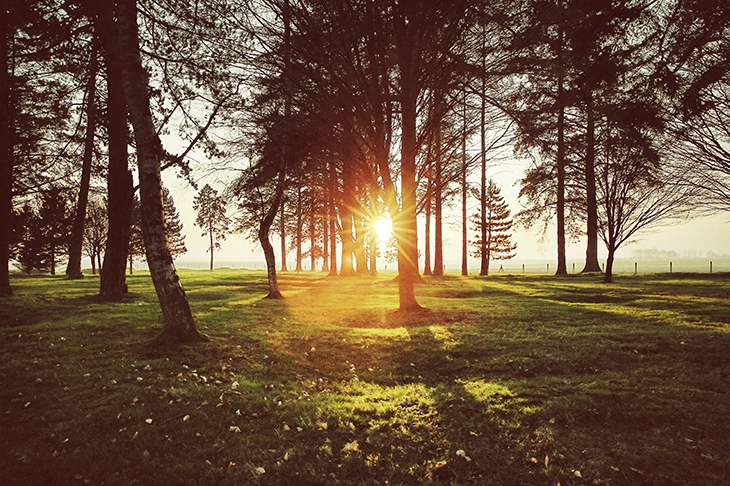Amid all the remembrance, Radio 3 came up with a simple yet effective way of reflecting on war’s impact. Threaded throughout the day on Sunday were ‘sonic’ memorials, three minutes of silence, or rather opportunities to stop and reflect. Not the music of a requiem mass, or a lonesome bugle, but the sounds of those places where the worst battles in recent history — from Antietam in America (during the Civil War) to Huaihai (between the Kuomintang and communists in China) via the Somme, Stalingrad and Afghanistan — were played out. Allan Little introduced each pause in the day’s schedule, explaining in the barest outline what happened, how many were killed, who was fighting whom, what the place of desolation looks like now, before we were left with just the sound of crickets humming, birds singing, wind blowing through sun-bleached grass.
In Kent, beneath the white cliffs, the Battle of Britain is remembered each year, the first major air battle in any war. The Last Post faded out as the sound of the aircraft looming overhead grew louder and louder. We could picture the men on board, trapped in a metal cylinder, deafened by the noise of the engines, the rattle of gunfire. Off the coast of Denmark, 8,000 seamen lost their lives in the Battle of Jutland, their bodies now at rest at the bottom of the sea along with the 25 ships that were destroyed. We could hear the barren loneliness of that bleak coastline; the salt-laden spray hitting the microphone, the eerie wailing of the wind like a chorus of grief. No words were necessary. This was storytelling through sound alone, evoking all the emotions that remembrance of war arouses. In Helmand province, the silence was punctuated by gunshot, shocking in its physical impact as it burst into my kitchen, assaulting not just the ears but punching the stomach. The war still goes on in Afghanistan after 17 years, Little reminded us. ‘How do you memorialise a war that’s not yet over?’
On the World Service, Naomi Grimley was in conversation with 90-year-old Joe Tydings, a close confidant of John F. Kennedy and his brother Robert. Tydings was born into the American political aristocracy, his grandfather sent to Russia to foster relations with Stalin. As a young man Tydings joined the Young Democrats, booked JFK as a speaker and became ‘a big fan’. He worked closely with the future president on his campaign. ‘My God it was exciting,’ he recalled. ‘He was extraordinarily handsome… that great smile… people were falling over themselves to shake hands.’
Tydings was at the White House when news that JFK had been shot reached Washington. Even now, he cannot recall that day without becoming emotional. ‘It was hard to believe this could happen to us, to America,’ he said. ‘It was just so tragic, so tragic for the country.’ When Lyndon B. Johnson was sworn in as president, all of us were crying. ‘He shouldn’t have been sworn in.’
From Truman to Trump (produced by Bob Howard) was recorded just in time as Tydings died in October. He visited the troops in Vietnam as the senator for Maryland. It convinced him that the war was wrong: little children, he recalled, were waving the American flag, but none of ‘our people’ could speak Vietnamese. He worked very closely with Robert Kennedy and knew him ‘like a twin’. His assassination was, if anything, ‘more crushing’ than JFK’s, Tydings said, because Bobby would have stopped the war in Vietnam much sooner if he had become president. Nixon would have been ‘blown away’. Watergate would never have happened.
We also discovered that Mar-a-Lago (now owned and presided over by Donald Trump) was built by Tydings’s grandmother. ‘It’s not a happy thought,’ says Tydings. Stranger still was his revelation that Trump has also taken over the family crest awarded to Tydings’s grandfather by the College of Heralds after he had served as an American diplomat at the Potsdam conference in 1945 alongside President Truman. The crest now adorns Mar-a-Lago with its original inscription, ‘Integritas’, changed to ‘Trump’. Friends offered to pay the legal fees for Tydings to take Trump to court, but he refused. ‘Don’t get in a to-do with a skunk.’
There’s much to deplore about the money being spent on the new BBC app, BBC Sounds, because it can only mean that vital money is being taken away from production, especially of plays, the vital blood of BBC radio. But it’s proving to be a really useful tool for navigating the burgeoning audio scene as podcasts compete with broadcast programmes for our attention. By chance I caught sight of a replay of a drama first broadcast in 1999, replayed on 4 Extra and now available on the Sounds website.
Encore by Nan Woodhouse is a classic two-hander starring Timothy West and Julia McKenzie as a couple trying to get together again after five years of separation. They’re also ageing actors in need of a good part. Why not devise their own two-hander? West and McKenzie give a master-class in microphone acting, razor-sharp and timed to perfection.






Comments